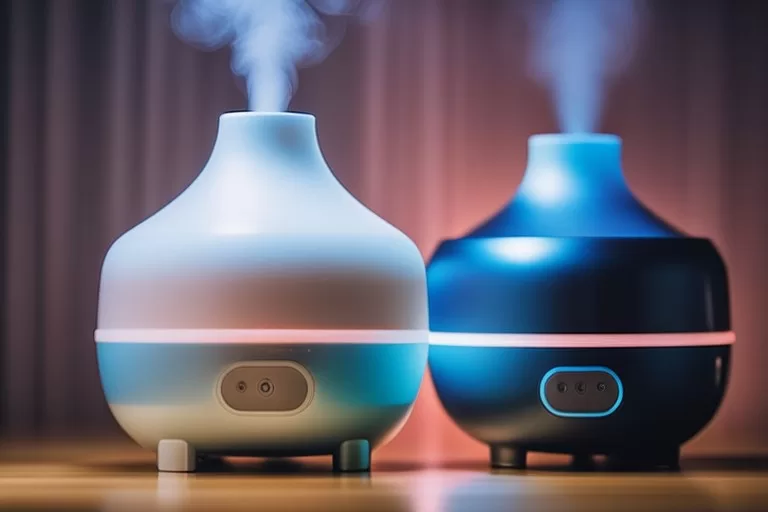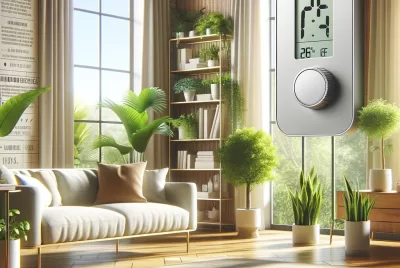Does a Humidifier Help with Congestion: Yes – Our Ultimate Guide
"We may earn a commission for purchases made using our links. Please see our disclosure to learn more."
If you’re suffering from congestion, you’re not alone. Millions of people worldwide experience this uncomfortable condition. Congestion can be caused by allergies, infections, or environmental irritants, and it can lead to other health issues, such as sinus infections, ear infections, and even sleep apnea. A question that comes to mind is – Does a humidifier help with congestion? The answer is yes. In this comprehensive guide, we’ll explore how a humidifier can relieve congestion, the benefits of using one, the different types of humidifiers available in the market, and much more.
Congestion can make it difficult to breathe, sleep, and even carry out daily activities. Fortunately, there are many ways to find relief, and one of the most effective ways is by using a humidifier. In this guide, we’ll explore what a humidifier is, how it works, and how it can help alleviate congestion. We’ll also discuss the types of humidifiers available in the market and the benefits of using a humidifier for congestion relief.
How a Humidifier Can Relieve Congestion
- A humidifier adds moisture to the air and can help alleviate congestion caused by dry air.
- Humidified air can improve breathing and alleviate symptoms of congestion, leading to better sleep quality and potentially enhanced immune system function.
- When choosing a humidifier, factors such as room size, noise level, maintenance requirements, and safety features should be considered, and proper cleaning and maintenance are necessary to prevent mold and bacteria growth.

What is a Humidifier and How Does it Work?
A humidifier is a device that adds moisture to the air. It works by releasing water vapor into the air, increasing the humidity levels in a room. Humidifiers are commonly used during the winter months when the air is very dry. Humidifiers add moisture to the air in several ways, depending on the type of humidifier. Some humidifiers use a wick or filter to absorb water, while others use ultrasound technology to create a fine mist.

The Link Between Dry Air and Congestion
The respiratory system is responsible for breathing, and it includes the nose, throat, lungs, and other structures. Dry air can have a variety of negative effects on the respiratory system. When the air is dry, the nasal passages can become dry and irritated, leading to congestion and other respiratory issues. Dry air can worsen congestion by making it more difficult to breathe. When the air is dry, the nasal passages become dry and inflamed, making it harder for air to pass through. This can lead to more severe congestion and other respiratory issues.
How a Humidifier Can Alleviate Congestion
A humidifier can help improve breathing by adding moisture to the air. When the air is humid, the nasal passages become moist, making it easier to breathe. This can help alleviate congestion and other respiratory issues. Humidified air can also have a variety of positive effects on congestion. It can help reduce inflammation in the nasal passages, making it easier to breathe. It can also help thin out mucus, making it easier to expel. Numerous studies have shown the benefits of using a humidifier for congestion relief. One study found that the use of a humidifier reduced the severity of congestion in patients with the common cold. Another study found that humidifiers can help alleviate symptoms of asthma.
Benefits of Using a Humidifier for Congestion
Using a humidifier can help relieve symptoms of congestion, including stuffy nose, dry cough, and sore throat. It can also help reduce the severity of congestion, making it easier to breathe. Using a humidifier can also improve sleep quality. When the air is humid, it can help reduce snoring and other sleep-related issues. It can also help you wake up feeling more rested and refreshed. Using a humidifier can also enhance your immune system. When the air is humid, it can help reduce the risk of infections and other respiratory issues. This can help keep you healthier and more resistant to illness. In addition to the benefits listed above, using a humidifier can also have other potential health benefits. It can help reduce dry skin, prevent static electricity, and even reduce the risk of certain types of infections.

Types of Humidifiers Available in the Market
There are four main types of humidifiers: cool mist, warm mist, ultrasonic, and evaporative. Cool mist humidifiers use a fan to blow air through a wick or filter that has been saturated with water. The air is then released into the room as a cool mist. Warm mist humidifiers use a heating element to boil water and release steam into the air. The steam is then released into the room as warm mist. Ultrasonic humidifiers use high-frequency vibrations to create a fine mist. The mist is then released into the air, increasing the humidity levels in the room. Evaporative humidifiers use a fan to blow air through a wick or filter that has been saturated with water. The air is then released into the room as a cool mist. Each type has its own advantages and disadvantages, and choosing the right one depends on your individual needs and preferences.
| Type of Humidifier | Advantages | Disadvantages |
|---|---|---|
| Cool Mist | Energy-efficient, safer for children and pets, good for larger rooms | Requires frequent cleaning and filter replacement, can be noisy |
| Warm Mist | Quiet operation, good for smaller rooms, can be used with medicated inhalants | Higher energy consumption, risk of burns from heating element, requires frequent cleaning |
| Ultrasonic | Very quiet operation, energy-efficient, produces cool mist | Requires frequent cleaning, can produce white dust if not used with demineralized water |
| Evaporative | Energy-efficient, good for larger rooms, low noise level | Requires frequent cleaning and filter replacement, can be noisy, not ideal for smaller rooms |
Factors to Consider When Choosing a Humidifier for Congestion Relief
When choosing a humidifier, it’s important to consider the size of the room you’ll be using it in. A larger room will require a larger humidifier, while a smaller room will require a smaller humidifier. Some humidifiers can be quite noisy, which can be a problem if you’re using it in a bedroom. Look for a humidifier with a low noise level if you plan on using it while you sleep. All humidifiers require some level of maintenance, so it’s important to consider the maintenance requirements when choosing a humidifier. Look for a humidifier that is easy to clean and maintain. Humidifiers can pose a safety risk if not used properly. Look for a humidifier with safety features such as automatic shut-off if the water level gets too low. Humidifiers are available at a wide range of price points, so it’s important to consider your budget when choosing a humidifier. Keep in mind that more expensive humidifiers may have more features and be of higher quality.

How to Use and Maintain a Humidifier for Maximum Effectiveness
When setting up a humidifier, it’s important to follow the manufacturer’s instructions carefully. Make sure the humidifier is placed on a flat surface and that the water tank is filled with clean water. To ensure maximum effectiveness, it’s important to clean and maintain your humidifier regularly. Follow the manufacturer’s instructions for cleaning and maintenance. To ensure that you’re using your humidifier correctly, it’s important to monitor the humidity levels in the room. You can do this using a hygrometer, which measures the humidity levels in the air.
Personal Story: How a Humidifier Helped Me Beat Chronic Congestion
For years, I suffered from chronic congestion that affected my breathing and sleep quality. I tried everything from over-the-counter medications to natural remedies, but nothing seemed to work. It wasn’t until a friend recommended using a humidifier that I finally found relief.
I invested in a high-quality cool mist humidifier and began using it every night in my bedroom. Within just a few days, I noticed a significant improvement in my congestion. I was breathing better, sleeping more soundly, and waking up feeling refreshed.
Over time, the benefits of using a humidifier for congestion relief became even more apparent. I was no longer relying on medications to manage my symptoms, and I had more energy throughout the day. Plus, I noticed that I was getting sick less often, which I later learned was due to the enhanced immune system benefits of humidified air.
Now, I recommend humidifiers to anyone who suffers from congestion or respiratory issues. It’s a simple and effective solution that can make a world of difference for your health and well-being.
Tips for Maintaining Good Indoor Air Quality
In addition to using a humidifier, there are many other things you can do to maintain good indoor air quality. This includes avoiding common air pollutants such as tobacco smoke, pet dander, and mold. Proper ventilation is also important for maintaining good indoor air quality. Make sure your home is properly ventilated by opening windows and using exhaust fans when cooking or showering. Air purifiers can also help improve indoor air quality by removing pollutants from the air. Look for an air purifier with a HEPA filter for maximum effectiveness.

Risks and Precautions Associated with Humidifier Use
Over-humidification can be a problem if the humidity levels in the room get too high. This can lead to mold and bacteria growth, which can be harmful to your health. Mold and bacteria can grow in humidifiers if they’re not cleaned and maintained properly. To avoid this, be sure to follow the manufacturer’s instructions for cleaning and maintenance. Humidifiers can pose a safety risk if not used properly. Be sure to follow the manufacturer’s instructions for use and safety precautions.
Conclusion
Using a humidifier can provide many benefits, including relief from congestion, improved sleep quality, and enhanced immune system function. To ensure maximum effectiveness, it’s important to choose the right type of humidifier and use it properly. In addition to using a humidifier, there are many other things you can do to maintain good indoor air quality. By following the tips and precautions outlined in this guide, you can find relief from congestion and other respiratory issues while maintaining good health and wellbeing.




